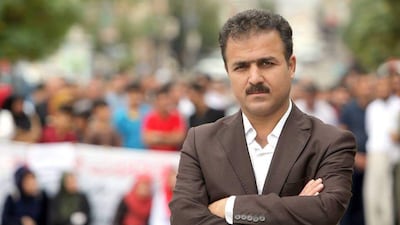Dana Abdoul, an Arabic language and Islamic studies teacher at a high school in Iraq's Kurdish region, finds himself at the epicentre of a prolonged economic crisis.
As a Kurd living in Kurdistan, Mr Abdoul faces a double blow – the impact of skyrocketing commodity prices driven by the fluctuated exchange rate that is affecting the whole country, and the long-running economic dispute between the federal government and the region that has left its coffers empty.
“The economic situation is very deteriorated and bad,” the 49-year-old father-of-four told The National.
Like other teachers, he has not yet been paid for August or September. His salary is 1.5 million Iraqi dinar (about $1,000).
“It’s a heavy burden,” he said, adding that he also helps his sister and brother from his wages.
The three-province Kurdish region has been involved in prolonged wrangling with Baghdad over revenue sharing. That has left the regional government unable to dispense full salaries and social service payments.
Meanwhile, the Iraqi dinar has wavered against the dollar since late last year after the Federal Reserve Bank of New York introduced measures to stop the flow of dollars to sanctioned countries through the currency auction run by the Central Bank of Iraq.
It has blacklisted several Iraqi banks over suspicious foreign transactions, while measures have been brought in to scrutinise the release of money from the US to cover imports and other needs.
That has pushed the exchange rate on the black market to 1,560 Iraqi dinar to one dollar, far from the official rate of 1,320, fuelling public anger over the soaring price of goods.
The teachers in Sulaymaniyah, one of three provinces that make up the Kurdish region under the Patriotic Union of Kurdistan (PUK), started their strike on September 13 and continued their action into the new academic year, which began on Sunday.
Teachers in Erbil and Duhok provinces, which are under PUK rival the Kurdistan Democratic Party (KDP), returned to work, fearing reprisals from authorities.
The PUK and KDP are the most influential Kurdish parties and run the region under a power-sharing deal.
On Tuesday, the Kurdistan region’s Education Ministry called on the teachers to return to class, but they refused.
The salary is “one of the basic rights of teachers”, the ministry said, calling on teachers to end their strike “because last year’s boycotts were harmful”.
“We notify all general directorates of education to start the academic year as soon as possible,” it added.
Under a temporary deal, Baghdad last month approved a request by the cash-strapped Kurdish region to release more funds. The first payment allowed the region to pay July salaries this week.
Early this year, the Iraqi Planning Ministry put the national poverty rate at 25 per cent. This was down from 31 per cent in 2020, during the outbreak of the coronavirus pandemic. Iraq’s population stands at about 43 million.
The inflation rate was 5 per cent in 2022, according to the World Bank.
Mr Abdoul’s plight is shared by many middle-class families who are feeling the pinch as they struggle to pay bills.
His eldest son, 21, tried to help out the family by working at a takeaway restaurant for 120,000 Iraqi dinars (around $77) a month, but he was laid off after three months.
“This summer, we didn’t travel abroad, and we didn’t even leave our house for any entertainment. We don’t have enough money to meet our daily needs and we have not even bought anything for the kids for school,” Mr Abdoul said.
“Some of the families are not sending their children to the schools because they don’t have enough money to buy their needs, from stationary to clothes, or even to give them pocket money,” he said.
Like many others, he buys goods and services on credit and repays it when he is paid. He currently owes $7,000.
“When we receive our salaries, we pay some of the debt and keep the rest,” he added. “Every month the debt increases, and there is no hope to pay all the debt, this is the case for all employees, unfortunately,” he said.


